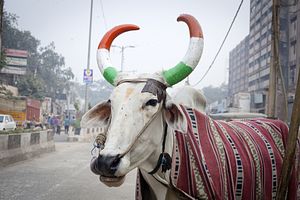India, which never fails to parade its secularism and multiculturalism, is suddenly feeling defensive about its nation-building project. The reason behind this resurgent nationalism is the growing assertiveness of radical right wing Hindu organizations. Ever since Narendra Modi led the Bharatiya Janata Party (BJP) to power, these fringe groups have unleashed a reign of terror on minority communities. Muslims especially are under siege in India today.
The most recent example is the killing of a 50 year old Muslim, Mohammad Akhlaq. Akhlaq was murdered by a fanatic mob because of a rumor that he was storing beef in his house (the initial investigation suggests this rumor was false). This incident took place in Bisara village in the Dadri suburb of Uttar Pradesh, about 50 kilometers from Delhi. Akhlaq’s 22 year old son who came to rescue his father was also heavily injured by the crowd, and is still in the hospital.
The incident has outraged the whole nation. It raises some very troubling questions about the sincerity of the Modi regime to reign in fringe Hindu groups, who have been causing disturbances throughout the country ever since the BJP assumed office. Akhlaq’s horrific murder has raised the question of the status of Muslims and their existence in the country. Under the Indian constitution, people of all faiths enjoy equal rights. This foundational principle of the Indian democracy, which has stood the nation in good stead for more than six decades, is under increasing strain.
Many politicians are adding fuel to the fire. Looking at the statements by senior ministers and parliamentarians of the ruling party after the Dadri tragedy, one sees a deliberate strategy to provoke society on the emotional issue of the protection of cows. The minister of culture, Mahesh Sharma, describes Akhlaq’s murder as “an accident.” Sangeet Som, another controversial parliamentarian, has expressed sympathy with the alleged killers and almost justifies murder if done to protect cows.
Similar provocative statements have come from other members of the ruling BJP. A senior member of the Hindu right wing and the part of the BJP’s inner circle, Tarun Vijay, uses the veneer of Hinduism to justify the barbarity in an open column in the Indian Express.
The BJP has a history of using India’s religious fault lines as a political tool to expand its constituency. But when Modi became the prime ministerial candidate of the party in late 2013, he promised to usher in a new political narrative and adopted the slogan “Sabka Saath, Sabka Vikas” — “Together with all, development for all.” It is this promise that drew all sections of society toward him and the BJP.
After a year and a half, some of that magic seems to be gone. The Economic Times reports that in the 18 months, the country has witnessed a significant rise in religious clashes, indicating very clearly that the BJP is still a polarizing party. A judicial commission appointed to probe 2013 Hindu-Muslim riots in the Muzaffarnagar district of Uttar Pradesh, which took place just on the eve of the 2014 parliamentary elections, blamed the BJP and affiliated local party, Samajwadi Party (SP), for the death of around 100 Muslims and the displacement of hundreds of families.
This polarization is not limited to politics. Last year, radical Hindu groups launched a campaign called “love jihad” to dissuade Hindu women from developing friendships with Muslim boys. This created tension in different parts of the country. An investigative portal, Cobrapost, in a sensational disclosure a few days ago, alleged a conspiracy on the part of the BJP and Rashtriya Swayamsevak Sangh (RSS) leaders to use the scare tactic of “love jihad” to create religious tensions.
“On what terms can Muslim minorities live in India today?” asks Harsh Mander in an article in the Hindustan Times. ”Must they subordinate themselves to what Hindu nationalists proclaim to be majority Hindu sentiment as the condition for being accepted as Indian? Or are they free to remain themselves, in worship, dress, diet, and language and still qualify in every way as fully Indian?”
“There is no doubt that we are under attack. We know that people with a certain mindset are ruling the country, and they would like to reshape Indian polity according to their narrow agenda and dreams,” says Zafarul Islam, editor of The Milli Gazette, the first English Muslim newspaper in India.
Many blame Modi. In a hard hitting article in the Indian Express, Pratap Bhanu Mehta writes that “the blame for this has to fall entirely on Modi.” Mehta, who is the director of New Delhi-based think-tank the Centre for Policy Research, says that “this government has set a tone that is threatening, mean-spirited and inimical to freedom” and “Modi … bears responsibility for the poison that is being spread by the likes of Culture Minister Mahesh Sharma and Vijay — whether through powerlessness or design is irrelevant.”
Economic development does not happen in a vacuum. It needs a conducive social atmosphere to be sustained. Comprehensive development means social harmony, rule of law, equality before law, respect for religion, and tolerance for diversity. The BJP must understand this.

































